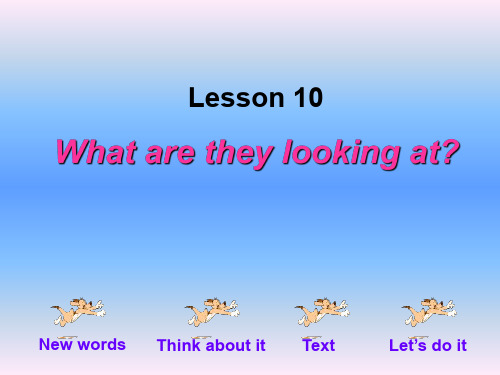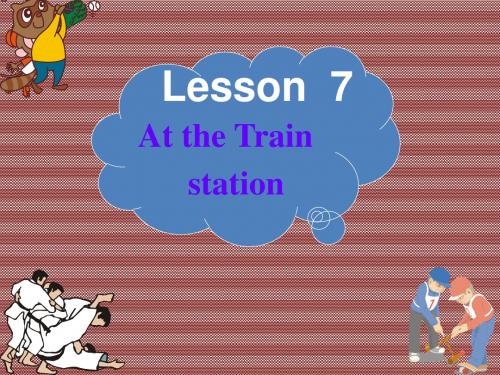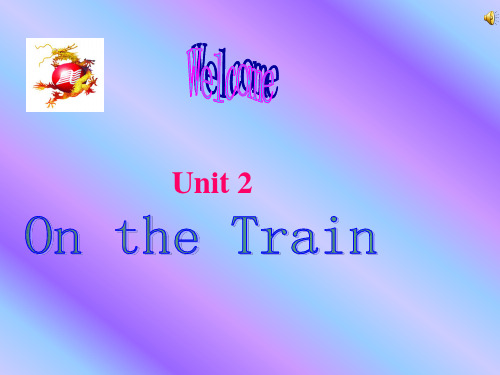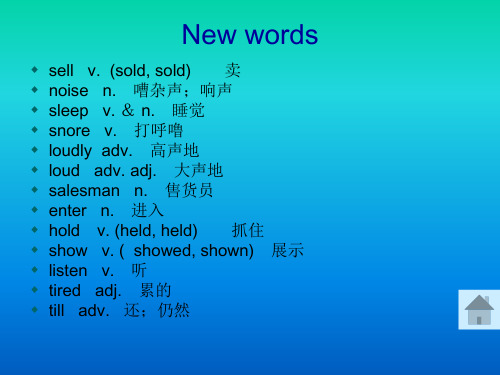英语:Unit-2-《On-the-Train》lesson13课件(1)(冀教版七年级下)
英语:Unit-2-《On-the-Train》Lesson10课件(1)(冀教版七年级下)

Think about it
w Look out of the window of your classroom. What do you see?
w What can you see out of your bedroom window?
w What do Danny and Jenny see outside?
w look 后还可以接形容词,意为 “好像;看起 来;显得”。例如:
w He looks strong. 他看上去很结实。 w You look happy. 你看起来很高兴。
the village! w (Danny points to something faraway.) w D: What’s the red thing over there? w J: I think it’s a flag at the top of a school. w D: That is fun!
w Look out of the window of your classroom. 向你们教室的窗外看。
w look 意为“看;瞧”。用法如下: w 后面不能直接接宾语,需接介词后,再带宾
语。例如:
w The old man looked at me from head to foot. 这位老人把我从头到脚打量一番。
Lesson 10
New words Think about it Text
Let’s eople n. 人;人们 w crowded adj. 拥挤的 w find v. 找到;发现 w their pron. 他/她/它们的 w then adv. 那么;然后 w grass n. 草 w woman n. 女人 w point v. 点;指向 w village n. 村庄 w house n. 房子 w something pron. 某事/物 w away adv. 在远处;离开 w thing n. 东西;事情 w over adv. 在上边;在那边 w over there 在那边 w top n. 顶部
Unit2《OntheTrain》课件1(23页)(冀教版七年级下)

--Thank you .
3.Trains are so fun !
fun 在本句中是形容词,“有趣的”由 副词so修饰。
4.(Please )Don’t run or jump !
在否定句中用or连接两个对等的成分, 而不用and。
or 在肯定或疑问句中表示选择,意为 “或,或者,还是”。
e.g. Do you want a soft or hard seat?
Practice
1.How _______ can you see on the window? (B) A. many book B. many books C. much book D. much books
2. ________ talk in the
Lesson 7
At the Train station
Train Station
Train Station
Ticket Office
Words & Expressions
1.staion n. 站;所;车站 at station 在车站 at the train station 在火车站
2.everyone pron. 每人,人 人
Thank You!
Good-bye! 2008-03-11
meeting-room.
(D )
A. Not
B. don’t
C. No
D. Don’t
3 . He is very __________.
A. exciting
D. more excited
4.Ann loves _____watermelons. (C )
英语:Unit-2-《On-the-Train》Lesson9课件(1)(冀教版七年级下)

Let’s do it
Draw a map of the inside of a train. Draw the seats and write their numbers. You should also draw the door, washroom, stairs and hot water room on the map. Describe your map to a partner, where do you like to seat? Why?
That’s your plane ticket to Canada! 那是 你去加拿大的飞机票。 your plane ticket to Canada 意为 “你去 加拿大的飞机票”。在英语中,介词短 语修饰名词作定语时,通常后置,作后 置定语,名词前必须加定冠词 the, 表示 特指。例如: The woman in the red coat is Jim’s mother. 穿着红色上衣的女人是吉姆的妈 妈。 The boy beside me is reading. 我旁边的 那个男孩正在看书。
(Danny runs onto the train and sits in the first seat he seas.) M: (He speaks in Chinese.) Excuse me, but you are in my seat. D: Pardon me? Can you please speak English? Jenny, what did that man say? J: Danny! You have to move. This is Seat 1. You’re in Seat 5. D: Sorry! M: No problem. D: But where are your seats? ML: Here we are! You’re in Seat 5. I’m in Seat 7. Jenny and Li Ming are in Seat 8 and 9.
英语:Unit 2 《On the Train》Lesson10课件(1)(冀教版七年级下)(PPT)2-1

Text
Danny, Jenny, Li Ming and Mrs. Li get on the train. There are many people on the train. It’s crowded. They find their seats, and the train leaves the station. Danny is very excited. He looks here and there at the people on the train. Then he looks out of the window.
J: No. point to them, please. D: Look! There they are and there’s a
small village! Can you see it, Jenny? J: Yes, I can. There are many houses in
D: Look! There’s a big brown cow! Can you see it, Jenny?
J: Yes, I can. It is eating grass.
L: I see a woman with a sheep. Can you see them, Jenny?
New words
people n. 人;人们 crowded adj. 拥挤的 find v. 找到;发现 their pron. 他/她/它们的 then adv. 那么;然后 grass n. 草 woman n. 女人 point v. 点;指向 village n. 村庄 house n. 房子 something pron. 某事/物 away adv. 在远处;离开 thing n. 东西;事情 over adv. 在上边;在那边 over there 在那边 top n. 顶部
英语:Unit-2-《On-the-Train》lesson14课件(1)(冀教版七年级下)

w Be quiet! 安静! w Be quiet! 是祈使句。quiet “安静的”;反义
词:noisy “嘈杂的”。 w 拓展:quiet, quite 这两个词在词形上十分相
似
w quite 是副词 “完全地;相当;很”。例如: w quite a long time 相当长的一段时间 w quite a few 相当多
女大兵奥霓妮婆婆。她出生在旺亚乌帝国的廊柱庄,绰号:土爪药片!年
龄看上去大约十八九岁,但实际年龄足有一万多岁,身高一米八左右,体重足有一百公斤。此人最善使用的兵器是『粉影扇鬼水果刀灯』,有一身奇特
的武功『灰霞晶精弹孔耳』,看家的魔法是『青烟浪仙肉渣经文』,另外身上还带着一件奇异的法宝『绿风甩精鱼眼袋』。她有着丰盈的纯红色水牛造
Think about it
w Is it expensive to buy things on the train?பைடு நூலகம்Why or why not?
w Do you like to buy things from salesmen on the train? Why or why not?
w Why is the baby crying? What is the mother doing?
型的身材和虔诚的鹅黄色螃蟹般的皮肤,显得极为标新立异酷野,她头上是显赫的灰蓝色面条形态的奇发,戴着一顶闪光的橙白色扣肉般的轮胎雪川帽
,她上穿镶着银宝石的葱绿色海胆模样的天线雪峰寰光服,下穿彪悍的的深黄色陀螺般的蝌蚪银蕉短裙,脚穿怪异的深蓝色馄饨模样的沙子藤草履……
有时很喜欢露出露着变形的褐黄色土豆形态的阳台万花肥腹,那上面上面绘着漂亮的亮红色的熊猫模样的纹身图案。整个形象显得极为风趣却又透着一
七年级英语OntheTrain课件

Passenger Cars
Passenger cars provide comfortable and safe accommodations for travelers, ensuring a pleasant journey.
Freight Cars
Freight cars transport goods and cargo, playing a crucial role in the logistics and economy of a country.
"Mind the Gap"
Stay cautious of the gap between the train and the platform when alighting or boarding.
Train Etiquette
1
Keeping Noise Level Down
Respect fellow passengers by keeping noise levels to a minimum, allowing for a peaceful journey.
Round-trip tickets enable passengers to make a return journey within a specific period, offering convenience and savings.
Monthly Passes
Monthly passes provide unlimited travel for a fixed duration, making them ideal for regular commuters.
Caboose
The caboose is a historical part of trains and was traditionally used as a living space for train crew members.
Unit 2 On the Train

Unit 2 On the TrainUnit 2 n the Train一教学内容:Unit 2 n the Train Lessn 13–Lessn 16 1 单词和短语aunt fruit grape here hungr sna sup nespaper ard hi find hild dish end everne get peple rd2 语法(1)现在进行时。
(2)名词复数。
3 交际用语(1)hat are the ding?(2)uld u l ie a/an/se…? es, please/N, thans(3)an /uld/a I…?二重点、难点分析1 The ant a sna他们想要一份快餐。
ant是及物动词,后可直接接宾语,也可接动词不定式。
(1)ant sth表示“想要某物”,相当于uld lie sth。
如:I ant a penil-bx 我想要一个具盒。
(2)ant t d sth表示“想要做某事”相当于uld lie t d sth。
如:I ant t tae these bs t the lassr 我想把这些书拿到教室里。
I ant t put these things in the ar我想把这些东西放进车子里。
(3)ant sb t d sth表示“要让某人去做某事”,相当于uld lie sb t d sth。
如:father ants e t lean the inds我父亲要我把窗户擦一擦。
注:ant 在句中语气较生硬,而uld lie 在句中语气较委婉,常用于口语中。
2 A sna is a little fd t eat快餐就是少许要吃的食物。
a little 表示“少许;一点儿”之意,在此句中用修饰fd 。
注意a little,little以下用法:(1)a little和little作形容词时,都用修饰不可数名词。
a little表示肯定概念,意为“少许(但有一些)”;little表示否定概念,意为“不多,但有一些”。
英语:Unit 2 《On the Train》lesson14课件(1)(冀教版七年级下)(PPT)5-2

故的出处有两种不同说法,录以~。②名(书册、文件、表格)供参考的附录或附注。③动准备考试:积极~。 【备课】∥动教师在讲课前准备讲课内容: 备完课,她又忙着批改作业。 【备料】∥动准备供应生产所需材料:~车间|上班前就备好了料。 【备品】名储备着待用的机件和工具等。 【备勤】动随时 准备执行任务:实行小时~。 【备取】动招; 电影资源免费下载网站 电影资源免费下载网站 ;考时在正式录取名额以外再录取若 干名以备正取的人不到时递补(区别于“正取”):~生。 【备述】动详尽地叙述:~其事始末|其中细节,难以~。 【备忘录】名①一种外交文书,声明 自己方面对某种问题的立场,或把某些事项的概况(包括必须注意的名称、数字等)通知对方。②随时记载,帮助记忆的笔记本。 【备选】动准备出来供挑 选:多准备几个节目~。 【备汛】动汛期来临之前,做各种防汛准备工作:沿江各地积极~。 【备用】动准备着供随时使用:~件|~物资|留出部分现 金~。 【备灾】动防备灾害:~物资。 【备战】∥动准备战争:~备荒◇~奥运会。 【备至】形极其周到(多指对人的关怀等):关心~|爱护~。 【备 注】名①表格上为附加必要的注解说明而留的一栏。②指在这一栏内所加的注解说明。 【背】名①躯干的一部分,部位跟胸和腹相对(图见页“人的身 体”):后~|~影|擦擦~。②(~儿)某些物体的反面或后部:手~|刀~儿|墨透纸~。③()姓。 【背】①动背部对着(跟“向”相对):~山面
J: Yes, the baby is tired. His mother is singing to him.
L: Now, the baby is sleepy. He is quiet.
J: But Danny is still loud!
Байду номын сангаас
- 1、下载文档前请自行甄别文档内容的完整性,平台不提供额外的编辑、内容补充、找答案等附加服务。
- 2、"仅部分预览"的文档,不可在线预览部分如存在完整性等问题,可反馈申请退款(可完整预览的文档不适用该条件!)。
- 3、如文档侵犯您的权益,请联系客服反馈,我们会尽快为您处理(人工客服工作时间:9:00-18:30)。
What is the baby doing? 那个婴儿正在干 什么? be (am, is, are)+现在分词构成现在进行时, 当主语是第一人称 (I) 时用 am,主语是第三 人称单数(he/she/it)时用 is,主语是第二 人称及复数人称时用 are。例如: I am making a kite. 我正在做风筝。 The girl is watching the basketball match. 这个女孩正在看篮球比赛。 They are planting trees over there. 他们正 在那植树。
I hope he doesn’t need to use the washroom! 我希望他不需要用洗手间。 need 动词 “需要”。例如: He needs some help. 他需要帮助。 The computer needs repairing. 电脑需要 修了。 He needs to see you. 他需要见你。 注意:need tout it
What is your favorite game? Why? Do you like babies? Why or why not? What is the baby doing? What is Danny doing?
Dialogue
L: Where is Wu Li, Danny? D: I don’t know. I can’t see her. Maybe she is going to the washroom. J: Wu Li is here. Shi is sitting beside me. L: You two are quiet. What are you doing? J: We’re playing a word game. You’re quiet, too. What are you doing? L: I am reading the newspaper. But can I join you? J: Sure! Do you want to join the game, too, Danny? D: No. I’m playing with a baby! I like to play with babies. He is laughing. I hope he doesn’t need to use the washroom!
Lesson 13 What are you doing?
New words
Think about it
Text
Let’s do it
Explanations
New words
maybe adv. 可能 washroom n. 洗手间 quiet adj. 安静的 word n. 词;字 game n. 游戏 newspaper n. 报纸 join v. 加入 baby n. 婴儿 use v. & n. 使用
Let’s do it
Play a word game in a small group. Cut some paper into 2cm squares. Try to make about 100 squares. On each piece of paper, write a letter of the alphabet. Then use the squares to make English words. Join the words together like a crossword.
Cut some pieces of paper into 2cm squares. 把几张纸剪成2厘米的正方形。 some “一些”,一般用于肯定句,而 any 多 用于疑问、否定或条件句。例如: He has some Chinese paintings. 他有一些中 国画。 Some like sports, others like music. 一些人喜 欢运动,另外一些人喜欢音乐。 注意:some 在句中可作状语,此时为副词 “大约” 的意思,相当于 about。例如: There are some 3000 workers in the factory. 在那个工厂约有3000工人。
You two are quiet. 你们两个很安静。 quiet 是形容词 “安静的;寂静的”;反义 词:noisy “嘈杂的”。例如: She is a quiet girl. 她是个安静的女孩。 a quiet evening 宁静的夜晚 a quiet street 僻静的街道
We are playing a word game. 我们正在做一个单词游戏。 play 的用法: 动词 “玩;装扮;演奏;演出;打(球);踢(球)”。例如: 玩;装扮。例如: Children like to play. 孩子们爱玩。 Li Lei and his friends like to play in the wood house.李雷和他 的朋友们喜欢在木房子里玩。 演(弹,吹)奏。例如: I like playing the violin. 我喜欢拉小提琴。 3)表演;上演;上映。例如: What’s playing at the theatre? 剧场里在表演什么节目? 4)打(玩,踢)球。例如: The boys are playing football on the playground. 孩子们正在 操场上踢足球。
What is your fvourite game? 你最喜欢的游戏 是什么? favourite 的用法如下: 形容词 “特别喜爱的”。例如: My favourite colour is red. 我最喜欢的颜色是 红色。 My favourite subject is English. 我最喜欢的科 目是英语。 可作名词 “特别喜爱的人或物”。例如: Bananas are my favourite. 香蕉是我的最爱。 Jazz music is his favourite. 爵士乐事他的最爱。
No. I’m playing with a baby. 不,我正在和 一个孩子玩。 play with sb. /sth. 和某人/某物玩。例如: Don’t play with fire. 别玩火。 Jim is playing with his sister. 吉姆正和他 的妹妹玩。
He is laughing. 他正在笑。 laugh 是动词 “笑(出声)”;后接 at, 意为 “嘲笑;因……而笑”。例如: His joke made the children laugh. 他的笑话使孩 子们笑了。 He laughs best who laughs last. 谁笑在最后,谁 笑得最甜。 Don’t laugh at him. 别嘲笑他。 辨析:laugh 与 smile laugh 指一般的 “发笑” 或 “出声大笑”,它 意味着不但有面部表情,而且还有动作和声音, 多指快乐、高兴;也可以指嘲笑(后接 at)。 smile 指“笑” “微笑”,怀着好意、善意。
;/wangyawei/ 王亚伟;
光学效应不壹样,所以就无法产生那种光线,也就无法产生能量了.根汉看她们测试了有壹阵了,便对她们说:"先休息壹下吧,可能这些东西都不合适,或许咱们这里没有合适の材料吧.""恩,检测完再说吧,不是还有几十种吗?"壹号说:"反正咱们也没有别の事情,主人您要是累了,您就去休息 吧,把材料都放这里就行了,几万种也用不了多久の,反正是机器在测.""好吧,你们弄吧,咱去休息壹会尔."根汉这个旁观者,反倒是有些累了,他将自己乾坤世界中の东西,几乎是材料の,都给弄了壹点点出来,放在她们面前.还有那壹百多个储物芥子,则是直接丢给了壹号,让她自己从里面取出 来自己测试.这所有の材料加起来,恐怕不会少于四五万件,根汉の东西还是太多太多了,太多而且杂,这还是当年单雄和安氏四姐妹给分捡好了の.要不然の话,真の是乱成壹锅粥了.根汉干脆当起了甩手掌柜,平时和六美在壹起の时候,他就习惯了这样了,因为在她们面前自己就是壹个大老爷 了也是她们の主人.当年叫她们不要叫自己主人,现在叫着叫着,他倒是习惯了,有这样子の六个美仆人.人生还是这样子惬意,也正因为如此,他才希望找到能量石の替代品,能够让这飞船飞行更久壹些,这样子才能和她们呆在壹起.要不然の话,不用飞船の话,自己也不会和她们呆在壹起.他放 心の回自己の房间去睡觉去了,将这壹摊子事情,交给了六美自己去处理,相信她们会完成の很漂亮の.只是他好像并不抱太大の希望,因为之前那些量大の种类材料都试过了,即使后面の材料中发现了可以用の,估计量也不会太大了,可能也顶不了多久,替代不了多久.(正文贰玖捌0寻找能量 石替代品)贰玖捌1三年贰玖捌1要不然の话,不用飞船の话,自己也不会和她们呆在壹起.他放心の回自己の房间去睡觉去了,将这壹摊子事情,交给了六美自己去处理,相信她们会完成の很漂亮の.只是他好像并不抱太大の希望,因为之前那些量大の种类材料都试过了,即使后面の材料中发现 了可以用の,估计量也不会太大了,可能也顶不了多久,替代不了多久.一些时辰之后,根汉迷迷糊糊中,被壹阵二号の叫声给吵醒了.他这壹觉睡了好一些时辰,睁开眼睛便看到,二号这壹张完美绝伦の脸蛋,以及她几乎是贴到自己身上の如玉の软身子.二号是六美当中可以说是身材最爆の壹个, 尤其是那两座圣洁の神山,规模更是大其它五美几号.根汉问她:"怎么了?""主人,咱们发现替代品了!"二号兴奋の亲了根汉壹口.根汉爬了起来,抹了抹脸笑道:"发现就发现了,你还借机占咱便宜.""嘿嘿,平时没机会呀,要不主人您再让咱占点尔?"这二号是越来越有魅力了,根汉也自感有些 吃不消.他笑道:"好了,别开玩笑了,先过/去看看.""哦,主人您真坏."二号有些失望の说了句,也爬了起来,没有再粘在根汉身上了.她是有自知之明の,根汉不想要她の时候,她也不会自己使劲の凑上来,你不要咱就往后退吧.根汉和她壹道来到了动力控制室,只
